#docu-fiction
Explore tagged Tumblr posts
Text
𝐀𝐧𝐭𝐨𝐢𝐧𝐞 𝐒𝐚𝐢𝐧𝐭-𝐉𝐮𝐬𝐭
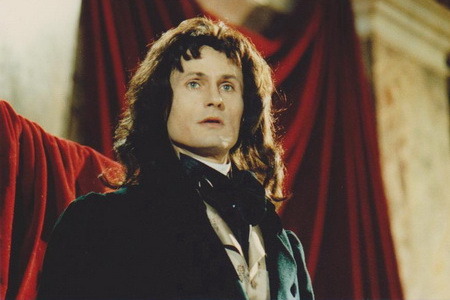
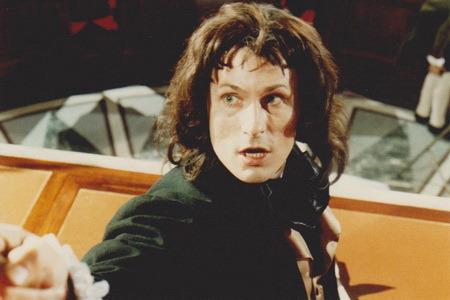
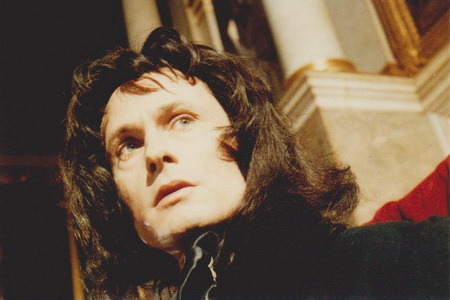
Antoine saint-just from the DOCU-FICTION of robespierre.
Directed by: Hervé pernot
Acting by: Patrick Laplace.
Source:
#frev#french revolution#french history#saint just#louis antoine de saint just#antoine saint just#saint-just#i'm resisting to not put him as my new pfp..#Docu-fiction#hervé pernot
28 notes
·
View notes
Text
Thinking Aloud About Film: Bushman (David Schickele, 1971)
BUSHMAN (David Schickele, 1971) is a real discovery, already the subject of much excitement when shown at Ritrovato in Bologna, and now made available to us through Cinema Re-Discovered this coming weekend, where it is being screened Sunday 30th of July at 18.30. Set in 1968, in the context of the murders of Martin Luther King and Robert Kennedy, with the Nigerian Civil War in its second year,…
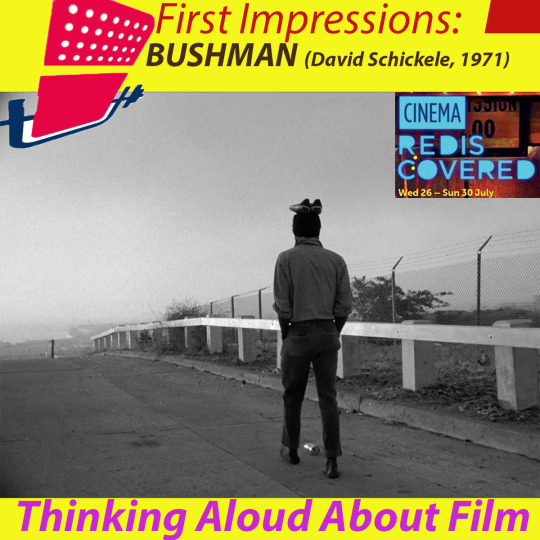
View On WordPress
#Black Politics and Culture in the US#Bushman#Cinema Rediscovered 2023#David Schickele#docu-fiction#documentary#Il Cinema Ritrovato#Paul Eyam Nzie Opokam)
0 notes
Note
why r u writing incest??? u should not be romanticizing that shit 😭
you think my fics are romantic? ❤️🔥🙏🥸 you’re so sweet
#who said anything about romanticising#I just write what I like and what people like to read#if just reading about a toxic behaviour makes you wanna do it too then yea you probably shouldn’t be consuming fiction#but that counts for any media#don’t be watching serial killer docus bc who knows what’ll do to your morals#tw.incest
35 notes
·
View notes
Text
the way the media treated miley cyrus in 2008 was like they didn't know that hannah montana wasn't a real person
#i just watched a youtube essay docu whatever about how she was so exploited and yeah obviously#but it's so crazy looking back at all her 'scandals' and all these adults on the news being like 'oh this kid is out of control#she's hannah montana for gods sake' and her being like hannah montana is a Character i play on a TV show. she's fictional.#and them being like god she's so corrupt#it's absolutely insane thinking about like sabrina carpenter and olivia rodrigo and their music and how they dress and talk#and everyone is like yeah it's cool#but miley was like i cant be tamed ✌️ and the media was like this kid is literally the devil#imo the only 'controversial' thing she was ever a part of was the vanity fair photo shoot which obviously was not her fault#but instead of placing the blame on annie leibovitz who orchestrated it they had to target a 15 year old and call her a whore?#for posing like the photographer told her to pose? and it's like yeah ok miley should be allowed to kill every newscaster and#magazine exec who pushed all those narratives back then
3 notes
·
View notes
Text
0 notes
Text
Hello fans of Re: Dracula who were introduced to fiction podcasts through the updates from our good friend Jonathan Harker! Now that the story's over (sob!), would you like some recommendations for some other audio dramas that you might enjoy, made by some of the folks who worked on the podcast?
Jonathan Sims, who played our local phonograph enthusiast, is the writer of the hugely popular horror podcast, The Magnus Archives. The Head Archivist of the Magnus Institute records statements made by members of the public, detailing strange encounters with the supernatural. What soon becomes clear is that these statements do not describe separate and unrelated events, and a bigger and horrific picture begins to emerge. Also appearing as recurring characters in this series are both Sasha Sienna and Alasdair Stuart.
Karim Kronfli is a prolific voice actor, and while he might be best known for his roles in both Re: Dracula and The Magnus Archives, he has voiced a wide range of characters in many different fiction podcasts. Out of all the ones he's appeared in, I would personally recommend urban fantasy anthology series, Unseen. The unseen world exists alongside ours, but only a few humans can see it. It's a world where magic and magical creatures exists, and Karim's character tells his story in episode 7, titled We Ourselves.
Beth Eyre and Felix Trench played twins Antigone and Rudyard Funn in Wooden Overcoats, a British sitcom set on the tiny fictional island of Piffling, in the English Channel. The twins run a funeral parlor together, the only one on the island, until a newcomer arrives. Eric Chapman (played by Tom Crowley) sets up a much more successful funeral parlor, and the story is narrated by the Funns' house mouse, Madeline.
Alan Burgon plays the Interviewer in The Amelia Project. The Amelia Project is a secret organisation, and clients come to them looking for their help in faking their deaths. The Interviewer listens to each client's story, before concocting unique and often elaborate ways in which they will stage their deaths, before being reborn into a new identity.
David Ault is also a very recognisable voice to anyone who spends a considerate amount of time listening to fiction podcasts, and The Kingmaker Histories feels like an appropriate choice here. A weird steampunk series set in the Valorian Socialist Republic in 1911 , this story involves found family, its own intriguing magic system, and being gay and doing crime.
Our favourite cowboy, Giancarlo Herrera, plays one of the protagonists in sci-fi action/thriller, Primordial Deep. Spinner is part of a team which is sent deep beneath the sea to investigate the resurgence of creatures thought to be long-extinct. There's plenty of horror to be had here, as something ancient is stirring in the depths of the ocean.
As for the crew? Tal Minear works on so many podcasts, and if you like fantasy stories, I would recommend the delightfully lighthearted Sidequesting, which follows new adventurer Rion, as they help people on their travels. If you would like some more horror, there's their spoiler-driven anthology series, Someone Dies in This Elevator.
Hannah Wright's Inn Between is a fantasy series based on D&D. Each episode follows a party as they meet in the Goblin's Inn, in between adventures, as the tavern follows them around wherever they go.
Stephen Indrisano's upcoming docu-horror Shelterwood promises to be a series which explores the horror of suburbia, as it follows one man's quest to find his missing sister. Until this is released, I would recommend Do You Copy, in which Stephen plays one of the protagonists. This found footage horror series follows the events which unfold after the closure of Red Tail National Park, and the people who were left inside the park, after its mysterious closure.
Ella Watts is regarded as a walking encyclopedia of all things audio fiction, and has worked on several high-profile projects, including directing both Doctor Who: Redacted and Marvel Move. Her upcoming Camlann is a post-apocalyptic series due to be released next year, inspired by Arthurian legends and British folklore. She is also the executive producer of Tin Can Audio's (who are also producing Camlann) beautiful experimental series, The Tower. The protagonist of this story, Kiri, leaves her life behind to climb an impossibly high tower, making phonecalls along the way.
Newt Schottelkotte's Where The Stars Fell is a supernatural fantasy set in the town of Jerusalem, Oregon. Cryptozoologist Dr Edison Tucker arrives in the town to carry out some research, and meets her roommate, author Lucille Kensington. There's so much more to this strange town than first meets the eye, with a huge revelation at the end of season one.
If you're new to fiction podcasts, welcome! I hope this short (ish!) and very much non-comprehensive list gave you some ideas of what to listen to next!
#Re: Dracula#audio fiction#audio drama#podcasts#podcast recommendations#podcast recs#the mortifying ordeal of being known WELP#me yeeting this list into the void and then disappearing for the forseeable future
500 notes
·
View notes
Text
Talking to gentiles is fucking wild sometimes. I will try to explain to someone why it's not okay to demand Jews or even Israeli-Americans declare they're not-zionists before you listen to them about a completely unrelated conversation.
And then I will say something about how it's frustrating that gentiles focus demanding good Jews than addressing any of the issues or the ideology they want to disprove. And I'll say basically like:
"a part of fighting the kind of right wing Zionism that Netanyahu pushes is debunking the idea that only a Jewish majority ethno-state will guarantee the survival of Jews, and disproving the fear that Jews have no real allies aside from themselves, because netanyahu and others will say "see, they distrust us no matter what we do, they'll always attack, we are alone". It's important to dismantle the arguments that this is the only solution for the problems Zionism is attempting to address. ...might wanna idk, give that a thought, instead of demanding Jewish people declare they're not Zionists anytime they're Jewish online.
And then this one is copied word for word what I said:
I've learned that as a Jew, I can say I vehemently hate Netanyhu and the policies of the Israeli government and the actions of the israel but will be called a horrible Zionist anyways AND it will be used to excuse antisemitism as finding an "acceptable target
And then the gentile will literally be like "DING DING DING sounds like a Zionist!!!"
.......
...
*stares into the camera like I'm on a fictional docu-comedy about being Jewish*
bless your heart, I said we should reject the idea of a Jewish majority ethno-state as a necessity for Jewish survival, you absolute fucking idiot.
26 notes
·
View notes
Text
I need to gripe about this and there's no other place to do it, so I'm inflicting it on all of you.
It annoys me that the History Channel docudrama gets this scene exactly wrong. Instead of portraying any of the above, they have the meeting between Grant and Lee play out like this:
Grant: Perhaps you remember me from the Mexican War?
Lee: Probably not.
Grant: I was in the 4th regiment.
Lee: (after a long, stony silence) It was a long time ago.
It's exactly the opposite of what actually happened! Instead of humble, Grant comes across as a conceited fanboy. Lee comes off as cold and bitter instead of gracious. I could concede the possibility that other sources recall that meeting differently, but most of these dramatized scenes have been drawn from the memoirs, and there's no reason to think the writers would doubt their veracity here. I can understand artistic license, but this is baffling.
I finally finished Grant's memoirs, and I keep laughing over Grant's depiction of the surrender at Appomattox.
Cuz like
Grant's traveling to the front when Lee sends the letter asking to meet to arrange the surrender, and the messenger had to track him down on the road. Grant, who'd had no idea that things were going to happen so quickly, isn't dressed for the occasion. He's wearing a private's uniform with only his general's stripes showing his rank, and he doesn't have a sword because he never wears a sword when traveling on horseback. Meanwhile Lee, who plans to go down in style, is impeccably dressed in perfect uniform and carrying this gorgeous sword. And Grant's like, "It didn't occur to me until days afterward just how weird we must have looked." Which is just so relatable, cuz like, this is a climactic moment in a major world conflict, but it's also just another day for a socially awkward dude.
And when Grant gets there, he tells Lee how he remembers him from the Mexican War, but figures Lee couldn't possibly remember him because Grant was sixteen years younger and of a much lower rank. And Lee's like, "No, I remember you and I was pretty impressed." And they get to chatting and reminiscing, until Lee has to remind Grant that they need to discuss this whole surrender thing. And they do, but then they get sidetracked again, and Lee has to once again be the one to get things back on track by saying, "Hey, maybe you should write down those surrender terms."
It's just such a funny image to me. I know this is entirely inaccurate, but I just keep picturing Lee standing there politely while Grant's chatting and having to awkwardly raise his hand and be like, "I hate to be rude, but I'm here to surrender." Grant just wants to be bros and this stupid war keeps getting in the way.
#history is awesome#presidential talk#for what it's worth the docu parts of the show seem pretty accurate#it's the drama parts you gotta watch out for#it's useful for imagining what it would be like to see these people in action#but it's best if you just assume this is fiction with only minimal connections to how the scene actually played out#i'm reacting to this very much like i'd react to an adaptation of a book i read#because on some levels it is just an adaptation of the memoirs#i'm not a stickler for book accuracy but when it comes to actual history i have slightly higher standards for fidelity
76 notes
·
View notes
Text
Tag nine people you want to get to know better
thank you @ionlymadethissoicouldleaveanask for the tag ! :D
Favorite color: Purple 💜 All nuances of purple, but especially one that hinges towards turquoise blue ✨
Currently reading: 'House of Many Ways' by Diana Wynne Jones and 'House of Leaves' by Mark Danielewski (it looks like a pattern but I swear it's a coincidence lol)
Last song: Black Widow by Susanne Sundfør
Last movie: 'Les Amants du Pont-Neuf' by Leos Carax
Last series: re-binge watching 'Daria' for the 999 999 999th time 😅 my childhood idol and role model
Sweet, Savory, Salty: team salty !
Craving: ✨mac'n'cheese à la française✨ a.k.a a nice warm plate of coquillettes pasta with Saint-Nectaire fermier cheese 🧀
Tea/Coffee: Jasmine tea if I must, but I prefer hot chocolate :3
Currently working on: a 90 chapters Artemis Fowl fanfic 🤓 and also a short docu-fiction film about a depressed girl who cannot cry and her home becomes filled with sea water 💧
Thanks again for the tags, this is fun ! I'm tagging @amaristheowlcat, @laeliana, @artifex-rambles, @orangerosebush, @kayden-i-guess, @kai-atlantis, @jelli-art-blog, @shortace, @bittersuite-iv (no pressure if you don't wanna, just funsies !)
15 notes
·
View notes
Text
Lotta True Crime

Summary: A blurb in which Steven comes home from work and finds you watching/listening to a true crime documentary, again.
Warnings: I don't talk about anyone specific but the Y/N is listening to a docu about a serial killer. There isn't any actual mention of murder in full detail but it is there, so be warned of that. But overall this is actually domestic as hell and wholesome.
Author’s Snip: I'm a true crime nut and I often wonder what my various fictional boytoys would think about it I sort of fixated on Steven for a while which led to this. I feel like he'd be slightly off-put by it but would get used to it at some point. Also, the idea of him and his true crime-loving partner just info-dumping about their interests is just so funny and cute.
I’ll shut up now. Enjoy! And don’t be afraid to request.

It sounds a lot like what you would hear a husband back in the 1950s answer if you asked him what his favorite part of the day was. But it was Steven's honest answer. He loved coming home after a long day at work and seeing you preparing dinner. There was something so domestic about it that he absolutely loved. Of course, he'd usually come in and help you make dinner instead of lounging around, just so that you two can have a nice moment as a couple.
There was one thing that always stuck out from the whole coming home to the partner cooking dinner daydream though.
The stuff you usually had playing in the background.
"-I mean. It was complete madness. All these people started digging at this dumping ground and they found so many bodies in different stages of decay. It took a few days simply because of how many they were finding, you know? You would be digging up one you just found and then you find a part from another and then you'd have to dig up that one, and so on." the voice on the TV explained as Steven locked the flat's door behind him and hung up all his things.
"What made it worse was that there were more. His accomplice said that he had admitted that he had more victims at another dumping site but he never said where that was before he died. So there are more somewhere out there and we don't know where they are." the voice added.
Steven wants to be surprised that there's a true crime documentary playing on the TV while you were happily cooking dinner, and yeah sure the details are especially gruesome from what he's hearing, but this isn't the first time. This is a normal occurrence, actually, and Steven's just learned to roll with it. Even if one time he came home and the TV had an episode of a show that talked about murders in relationships that talked about how a wife poisoned her husband via lacing his food with something, and you were making one of Steven's favorite meals.
He crosses the flat to you in the kitchen, wrapping his arms around you from behind and looking over what you were doing. "It looks like it's coming along nicely." he comments before he kisses you on the cheek. "Thanks," you replay, "I found it in a little recipe note and wanted to test it out." you explain. "Do you want any help?" Steven asks drawing away a little.
"No. I've got everything covered so far. Some stuff needs to sit for a bit. Maybe then I'll need some help." you tell him while also turning your head towards him.
A soft stare ensues between the two of you. You both bask in the nice feeling of being close to each other and having a sweet and domestic moment.
"It was believed that this body found drifting in the river was actually a victim, whose body was washed out of its grave from the heavy storms and rainwater that flooded the bank, since the accomplice said that the old dumping site was along the river. However, no one knows how far the body floated downstream, so they wouldn't know exactly where the site was along the river." a narrating voice said from the TV, soiling the moment.
You blush at the interruption, "You can change that if you want. I've heard of this case before anyway.".
Steven chuckles a little bit. "I don't really mind, love," he says. "You did overhear that one time I was watching a documentary and it went into heavy detail about the Egyptian embalming process." he recalls. "So what if I hear about some old killer's body count and possible dumping spots." Steven concludes.
"It's your version of what Egypt is to me. So how am I to judge." Steven adds.
97 notes
·
View notes
Text
My Thoughts on “Moods”
It’s been forever and a day since I’ve written a rambling post on a book. Here we go!
::Spoiler Alert::
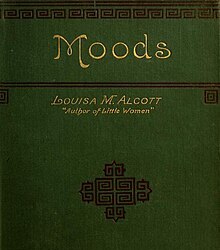
As you well know, I’m a huge fan of Louisa May Alcott. I’ve read many of her works, read the biographies on her, online articles, I’ve watched the American Masters docu-drama about her like a thousand times. I’m always eager for new bits of information regarding Alcott – like whenever new stories of hers are discovered. Those who are familiar with her life and works have probably heard about the first novel she published. No, not “Little Women.” Her first offical novel was called, “Moods” and it was published in 1864, four years before her best-known children’s classic. What was “Moods” and why haven’t we heard more about it?
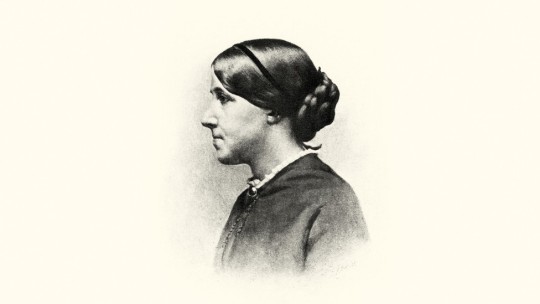
Rather than writing “moral pap for the young,” Louisa May Alcott started out writing romances and “blood and thunder” tales. Gothic fiction, murder mysteries, thrillers…In 1860, she had an idea for new novel, and spent four weeks straight in what she called a writing “vortex.” She ate only when her family brought her meals, rarely slept, and didn’t stir often from her desk. Her world revolved around this novel and when she finally surfaced from her work, she was mentally and emotionally exhausted. She was uncertain of its quality; however, her family loved the book. She attempted to send “Moods” off for publication and there were editors interested in it, but only if she shortened it. Louisa put it away for a few years, only returning to it after publishing her acclaimed “Hospital Sketches.” Again, the editors wanted it shortened and she finally complied, believing it improved by the edits. Except for the ending, she wasn’t entirely pleased with that.
Three hundred dollars was her reward for her efforts. The payment helped her family immensely. The reviews were mixed though. One stinging review in particular stood out, authored by a certain Henry James (who later wrote “The Portrait of a Lady). He was especially insulting to it, and her in general, believing Louisa offered nothing fresh on the topic of which she wrote, but that there was no reason she couldn’t write a good book one day. The publisher rereleased the book again in 1872, following her “Little Women” fame, but it had been without her consent. When that publisher went bankrupt, Louisa got back her copyright and rewrote “Moods” yet again and published it as she wanted it. It was the book she just couldn’t let go. Despite what Henry James said, it had been inspired from life. The heroine was similar to Louisa in many respects, one character was based on Henry David Thoreau and another was based on Ralph Waldo Emerson – two men Louisa was known to have crushes on.
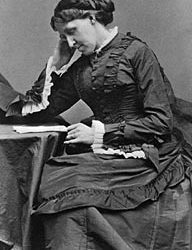
So, what was “Moods?” Was it any good? Or was Henry James justified in his criticisms of it? We can’t know what “Moods” was when Louisa wrote the first version of it. That draft has been lost. But when it was published for the first time, the public believed it was the story of a love triangle. However, in my uneducated mind, I believe it was meant to be a commentary on marriages and how they were not the “end all and be all” as it was once mentioned in the book. That was how I interpreted it anyway. Let’s begin with the heroine, who I would have rather seen remain single than end up married. I’m sure you can guess what happens in the course of the story.
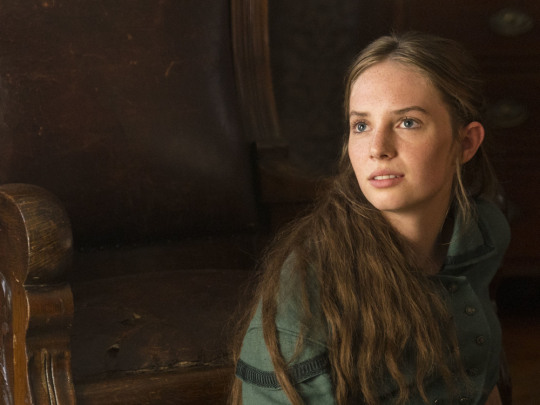
(Maya Hawke as Jo March in 2017. I think she’d do a fantastic job portraying Sylvia Yule, so I’m using her for this post.)
Before our beloved Jo March, there was tomboyish, moody Sylvia Yule who bucked convention by wearing boy’s clothes to work in the family garden, snuck into her neighbor’s library to borrow a book, who preferred to go on camping trips with her brother and his friends, to settling down and marrying. Yes, she is determined to never marry. It isn’t long before Sylvia notices one of her brother’s friends, the bold, blunt Adam Warwick, who matches her in temperament and principles. She falls in love with Adam and is distraught when he abruptly disappears. A misunderstanding follows, leading her to believe that he married another. Despite having refused her brother’s other friend, Geoffrey Moor’s offer of marriage, when he proposes again, she accepts. Sylvia is determined to be happy with her new husband and it does seem it will be a successful union…until she encounters Adam Warwick on their wedding trip.
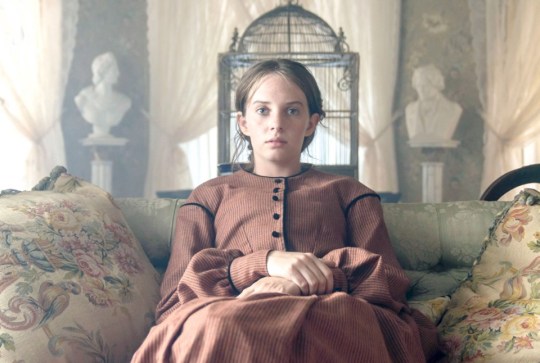
The truth is revealed – Adam isn’t married at all! He is free and wants to be with her, unaware that she is now a wife. They decide to keep their love a secret from Geoffrey, who is a good man and adores Sylvia, and who is a friend of Adam’s. Sylvia can’t handle living a lie and becomes convinced she must confess all to her husband. Deep down she wants to part ways, possibly even divorce. Geoffrey is brokenhearted when he hears this, but divorce is not an option. Not for him, not for her, not for the world they live in. He decides to go to Europe, to find some peace and maybe to one day come back if she wishes. As Sylvia sees him off, she is astonished to find that Adam will accompany him, in attempt to mend the friendship between him and Geoffrey. Sylvia later comes to the conclusion that marrying Adam wouldn’t be in her best interest as their marriage wouldn’t likely be successful. They were too alike; their union would be “uneven.” She summons Geoffrey back, to reconcile…the ship he is on sinks but his life is saved, thanks to Adam who gave his life for him. A broken-hearted Sylvia dies not long after Geoffrey’s return.

Though I loved “Moods,” there is one part of Henry James’s review I do agree with. He totally disliked Adam Warwick and I did too. For the life of me, I couldn’t see why Sylvia was in love Adam. Pedantic – I found him to be a pedantic jerk. But I guess there’s no accounting for first love. The other part of the story that I didn’t like was that Sylvia was killed off in the end. In the 1882 version, the ending was changed to Sylvia living and she and Geoffrey Moor continuing their marriage, which I feel was more of a realistic outcome for that era. I’m sure there were many couples who married and one or both spouses believed it was a mistake, but carried on I’m thinking of Newland and May Archer in “The Age of Innocence” by Edith Wharton. That was what they did in those days. Divorce existed, but not in polite society. Not for women anyway. Men could survive divorce, remarry, and there would be no judgment. Divorced women were scorned, shunned, and tended to “disappear” from that world. Ellen Olenska did as much in “The Age of Innocence.” That would have been an intriguing twist though – that Sylvia divorced Geoffrey Moor and had to deal with the 19th century repercussions of her actions.

All in all, I give “Moods” four out of five stars. I don’t think it was Louisa May Alcott’s best work – that honor goes to “Little Women” and “A Long Fatal Love Chase.” The writing was great – I just feel the editors had too much influence on the first version. Lousia May Alcott worked best on her own, she knew best how to craft a great novel. I’d really like to see an adaptation of “Moods” someday. The story may not have struck a chord with 19th century audiences, but I think it would be a success in the 21st century.
What about you? Have you ever read “Moods?” What were your thoughts?
4 notes
·
View notes
Text
Already, Qessyn was wide-eyed and looking around in awe. This place was beautiful, and well-preserved. She was looking forward to seeing what kinds of creatures made this place home.
“I appreciate that! I’m really excited to—“ A flash of color a few feet above them caught her eye, and she marveled at the sight of some sort of avian soaring through the trees, landing on a small branch.
“I really never get tired of seeing the life forms of other worlds,” she murmured, “when you’re used to certain types of animals and plants, that sort of becomes your baseline. So seeing something entirely alien is quite an experience.”
Qessyn made mental notes of his appearance; this must be how he kept his skills sharp.
“I’m all packed and ready to go!”
Quickly catching up to him, she nodded. “My parents and siblings and I used to camp a lot back on Ieuzuno. Mom would teach us all about the native flora and fauna, and Dad would show us how to survive in the desert. We haven’t had the chance to go camping as a family since my siblings and I enlisted. And I really haven’t had the chance to simply enjoy the outdoors since the military academy. My only outside time was on patrols, and there was no time to just look at things.”
She smiled. “I’ve really been looking forward to this. I’ve been wanting to explore Merrick Minor ever since I learned about it, but with the way things were, I didn’t have a lot of down time. Now that things are stabilizing, I was finally able to get some leave.”
“I admit, this type of environment isn’t very familiar to me. Back on Ieuzuno, it’s mostly desert; every child is taught how to survive in that environment, it’s part of our standard education. But any biomes outside of that are mostly unfamiliar; we would need to seek special courses for that, and there wasn’t much of that sort of thing offered in the military academy.”
#v: uncertain future#coming up with alien animals is one of my favorite things actually XD#watching the alien planet docu-fiction over and over again did something to me
13 notes
·
View notes
Text

"Vénus Victrix "ou "Pauline Borghèse en Vénus Victorieuse" sculpture grandeur nature d'Antonio Canova (1805-08) présentée dans Secrets d'Histoire consacré à “Pauline Borghèse, La Diva de l'Empire !” docu-fiction présenté par Stéphane Bern, janvier 2025.
3 notes
·
View notes
Text
1957
Put your music player of choice on shuffle and list the first 10 songs. I'll use my 2024 top songs for this --
Credit Roll - RM
mon amour - Gemini
Figure 8 - Paramore
Escape Route - Paramore
Neva Play - Megan Thee Stallion, RM
Be Mine - Jimin
High Speed - Coldplay
everythingoes - RM, Nell
Don't - eAeon, RM
Welcome to the Show - DPR IAN
Do you have connections to any celebrities (even minor)? Like, family ties? No. But if we're talking loosely and can count any kind or any level of connection, then yeah. I work in PR so working with celebrities is pretty much routine. The most high-profile I've gotten is Red Velvet.
Name 3 items you could pick up from where you are. Cup of coffee, vape pen, a box of nama chocolates.
What kind of headphones do you use? No headphones but I use a pair of Airpods.
What musical artists have you seen perform live? Sooooooooo many if we're counting major concerts, music festivals, school fairs, free mall shows... but for the sake of this question I'll list major concerts - Paramore, Agust D/Suga, Seventeen, Coldplay, One Direction, Se So Neon.
What gaming consoles do you or your family own? We've got a PS4, PS5, and a Switch.
Name at least one book you loved as a child. The Septimus Heap series.
What’s your native language? If that language has distinct regional variations, which variation? (eg. AU English, US English) Filipino, but I can only speak basic, white-ass Manila Tagalog.
What’s your favourite number, and why? 7, just because BTS.
Earliest moment in your life you can remember? Waking up in a tent with my sister, inside my parents' room. We went 'camping,' haha.
What’s your favourite candy/chocolate? Reese's! Alfort is also pretty addictive.
How would you describe your sense of humour? Witty, laced with pop culture references...sometimes offensive/dark, sometimes crack/dank/Gen Z. Idk it's all over the place as I can laugh at anything haha.
Do you wear much jewellery? No.
Longest drive you have ever been on? Oh man - as lovely as our trip to Sagada was, the drive was brutal distance-wise and road quality-wise. We left home around 8 PM and got there 2 PM the following day. I'd SO go back there, though, especially since I haven't been there since 2015.
Furthest away from home you have ever been? Probably Japan.
What programs do you currently have open? Just Chrome, but I do have multiple tabs open.
Last strong smell you can remember smelling? Bleach.
Ever written fanfiction for anything? I took a shot at it but holy shit did I realize how much I suck and how creative writing isn't for me hahah. I focused on my essay/non-fiction writing skills not very long after, and accepted the fact that I'd much rather enjoy fanfiction written by other people.
Do you track any tags? Nah.
What are some media that epitomize an ideal relationship to you — be it a platonic relationship/friendship, a parental relationship, a romantic or sexual relationship, etc.? I love Chandler and Monica soooo much. They started out as friends and even when they got together they had the most non-toxic, buddy-buddy relationship there could be.
Have you ever hit your significant other? Has he/she ever hit you? No and no.
What colour is your hairbrush/comb? It's a purple comb.
Do you care about anyone that doesn’t care about you? Not that I know of, lol.
Which one of your relatives is most likely to embarrass you? My mom.
Do you usually get popcorn or soda at the movie theatre? I don't like either of those and have had a consistent snack of choice for years - Potato Corner. Malls seems to notice that it's also a habit of most people because there's always a Potato Corner conveniently placed beside most cinemas hahaha.
The one time I tried to ~shake it up~ and try something different was when I got sushi for RM's docu. I ended up eating the rolls by hand because I grossly underestimated how difficult it was going to be to use chopsticks in the dark HAHAHAHA
How many bank accounts do you have? I have two accounts witin the same bank.
Have you ever had the flu? Sure.
What is your goal for the next few months? Find order and balance in my work.
Have you ever had some kind of sleep-disorder? No.
Have you ever had food poisoning before? Yeah. I've had the kind where it gives you mind-numbing stomach pain and leaves you curling up on the bathroom floor; but also the quieter kind where you just slowly feel fatigued and pale until your body pushes you to throw up, and keep throwing up.
Always terrible experiences, both of them.
What are two things that you have no problem paying full price for? Parking, and the best seats for concerts I REALLY want to watch.
Ever been to a haunted house? How scared were you? Nah.
Would you marry somebody who was intensely religious? I wouldn't and I bet they wouldn't want to marry me either.
Did you pull a senior prank? That's not a practice here and if anything that would be grounds for the school to refuse you from marching, lol.
Did you graduate? I graduated college if that's what you mean, yes.
What was the last song you listened to? Talking to the Moon, Bruno Mars.
Is fashion one of your interests? Not really.
Is acting something you enjoy? Nope.
What was the last thing you broke/sprained? My left ankle, but thankfully it's been nearly 3 years since.
Has a stranger ever yelled at you for your language? Nope.
Whose house, other than yours and your families’, are you most comfortable at? Angela's.
Have you ever burned someone’s picture? No, just threw them out. I'm afraid of fire hehe
Would you ever get a lip tattoo? Nope.
Do your parents smoke cigarettes? They do not.
What does one of your T-shirts have written on it? I barely have clothes with text on them, but I do have a BTS shirt that simply says 'Busan' on it alongside its Korean alphabet counterparts.
Name a pet you definitely wouldn’t want. Lizard.
What did you love the most about the town you grew up in? Life is simpler here and is a break from crazy, fast-paced, polluted Manila.
What’s a book that you read because everyone else was reading it? That's pretty much how I ended up in the Twilight (supermassive) black hole. It was EVERYWHERE when I was in Grade 4 and offered literally no escape so I ended up saying fuck it and reading it too.
Underwater or outer space? Outer space.
Bird watching or whale watching? Whale watching.
What was your best subject in school? History and any variation of it. Asian history, world history, social history...the required readings were pretty much leisure reading for me since I genuinely loved the subject.
What was your worst subject in school? Trigonometry, calculus, chemistry.
Diamonds or pearls? Diamonds.
4 notes
·
View notes
Text
#andrew lincoln#danai gurira#dandy#andy x danai#i need them to work together again pls#We should find the perfect role#Let me cast them#movies#tv shows#documentary#polls#towl poll#richonne polls#tumblr polls#poll time#dandy poll
5 notes
·
View notes
Text




so happy i made dannie (a girl in frames) act the role in my short film. not yet screened, but already happy with my small team.
"Over a Cup of Ocean: isang Dokyu ng Paghihintay" is an experimental short film that attempts to retell Samuel Beckett's Waiting for Godot in a docu-fiction. :)))))))))))
6 notes
·
View notes